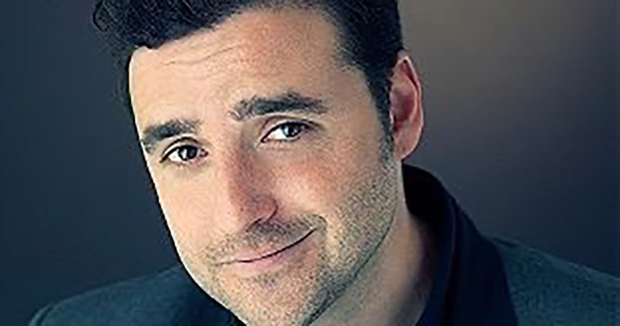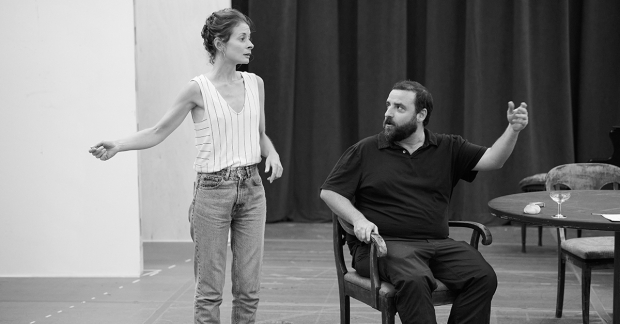Interview: Through Tom Stoppard's Leopoldstadt, David Krumholtz Embraces His Jewish Pride
The Hollywood character actor returns to Broadway for the first time in three decades.
David Krumholtz wasn't an actor when he made his Broadway debut. At 13, he had accompanied his friends to an audition for a role in the Broadway production of Herb Gardner's Conversations With My Father, and sure enough, ended up landing a role he didn't even want to try out for. That launched a unique and surprising career, dotted with iconic 1990s films like Life With Mikey, Addams Family Values, The Santa Clause, and 10 Things I Hate About You.
A prolific screen career followed. He did 113 episodes of the series Numb3rs, 20 episodes of The Deuce, and more films, like the Harold and Kumar series. Now, he's returning to Broadway, three decades after his inadvertent debut, in one of the central roles in Tom Stoppard's Holocaust drama Leopoldstadt, which begins performances tonight at the Longacre Theatre. This role scared Krumholtz more than any of his others. But it also reconnected him to his Jewish roots. Here, he tells us about getting ready for the production.

(image provided by the production)
This conversation has been condensed and edited for clarity.
It's been 30 years since you made your Broadway debut as a kid in Conversations With My Father. How does it feel to be coming back with Leopoldstadt?
It's important to note that, thematically, the plays are very similar. Conversations With My Father is a play about a Russian Jewish immigrant on the Lower East Side who was in denial of his identity, and was all about becoming less Jewish and changing his name, and the flack he gets for that from his family and friends. He had enough of being persecuted for being Jewish and America, in his mind, was the land of a new start.
Hermann, the character I play in Leopoldstadt, is very similar minded, but he's in Austria, in Vienna. Modern Vienna, a city of art lovers and intellectuals like no other. When we find him, he's already 15 years into having converted from Judaism to Christianity. He has this awkward mix of a Jewish mother and a non-Jewish wife, and he gets a lot of flack for that, just like the character Judd Hirsch played in Conversations With My Father. And it comes to a point where he's forced to accept the natural law of who he is and how your identity can be chosen, but it can't necessarily be undone, which is an interesting theme relevant to our times.
This is the completion of a circle for me, or the beginning of a new circle. My first job ever was Conversations With My Father. I got discovered off the street as a kid. I'd never acted before, nor did I want to be an actor. So it's just odd that, 30 years later, this play has come into my life. I'll be honest with you. At first, I had a lot of fear about saying yes to auditioning for it.
Why?
I felt strongly that I was not up to the task. It had been 30 years since I stepped onto the stage, and, I mean, I've done multicam sitcoms for live audiences, but that's a different beast. I didn't know if I could do it and I thought it would be a disservice to the play. To [director] Patrick Marber's credit, he wouldn't take no for an answer. We had a long discussion about my particular issues, and sometimes, you do need somebody to say "You're the guy we want," and then you have to wrap your head around that. Because we all have an image of ourselves that we think is the real thing, and then there's this essence of ourselves that other people see that we never quite grasp. He believes in me, so I should probably audition. And here I am, three weeks into rehearsals thinking that I was born to do this. It's been revelatory. This rehearsal process is a challenge and really exciting, and is the reason I have sat in the audience of a thousand plays in the last 30 years, and auditioning for plays throughout and not getting them and being frustrated. I've been pining for an opportunity to get back on stage.

(© Jenny Anderson)
What have you gone out for, if you're willing to say?
Oh, a few things here and there. I almost did The Bedwetter prior to the pandemic. I almost did The Sunshine Boys in Los Angeles with Danny DeVito and Judd Hirsch, but it didn't work out. I'd come close a bunch of times. But this is the experience I wanted, as difficult as it is. This is the experience I longed for. It is a stark mirror, not only to myself as an actor, but to myself as a Jew. I'm not a practicing Jew, if you will. In many ways, as an actor, I've been avoiding or trying to play Jewish roles, even though, in the last few years, that's what I've been doing, because that's how I'm seen. I've had insecurity about it. I'm open to saying that. But I hope this play has this same effect on audience members who might feel similarly about their religious identity. It's had a profound effect on my pride as a Jew.
This play is interesting to me as a Jew, because I find that…In the media, Jewish history is generally depicted as the Holocaust.
That's one of my concerns with the genre. It's been done, and it's been done really well. But it ended with Jacob the Liar and Life Is Beautiful. Both very good movies, but both Holocaust comedies. And everything after Schindler's List is derivative. So you get to a point where you go, "Well, that's plenty." That was my concern with doing this, because I want to see more stories about prosperous Jews.
Right. And the direction Stoppard takes the genre in this play is something I don't think I've ever really seen depicted.
This particular story is about an interfaith family in the heart of the Holocaust, which is something that hasn't been discussed. That there were Jews in that time that were attempting to escape their Judaism, whether it before their own personal preference or for survival. So what of the Jews that converted to Christianity or Catholicism? Did they avoid the gas chambers? And what does it matter if, at the end of the day, they're gonna put you on a train and send you off to be killed anyway? This is a very heavy play, there's no doubt about it, and it ends in a very blunt force trauma manner. But I believe there's hope and a lesson to be learned.
What is it?
My hope is that the audience, the Jewish audience and the non-Jewish audience, can sit at the end of the play and go "it's 2022, and with all our problems, we've still come a long way." It's been 80 years since the Holocaust, but it's been 80 years of prosperity. And in that way, it has that lesson to teach people.









